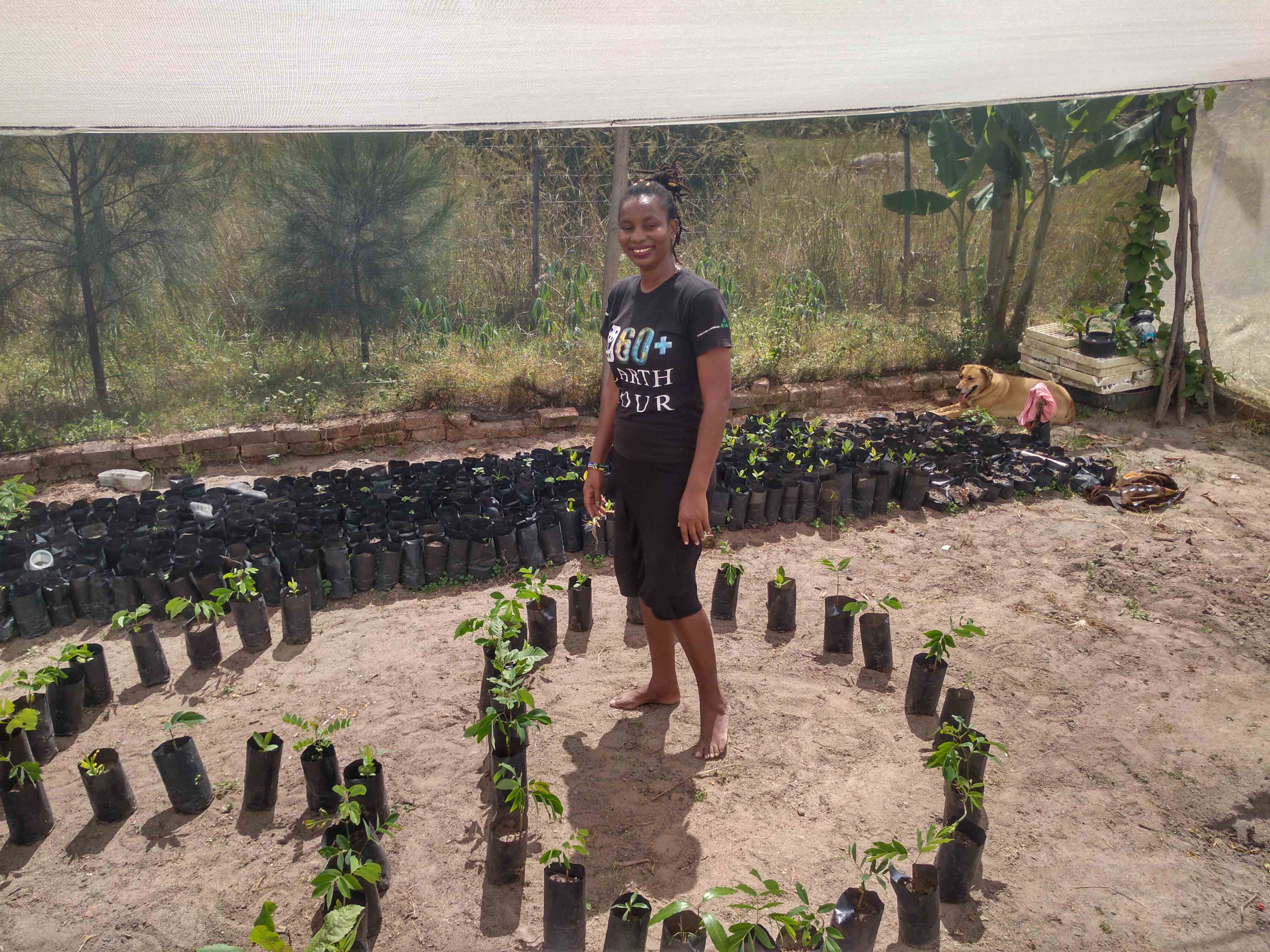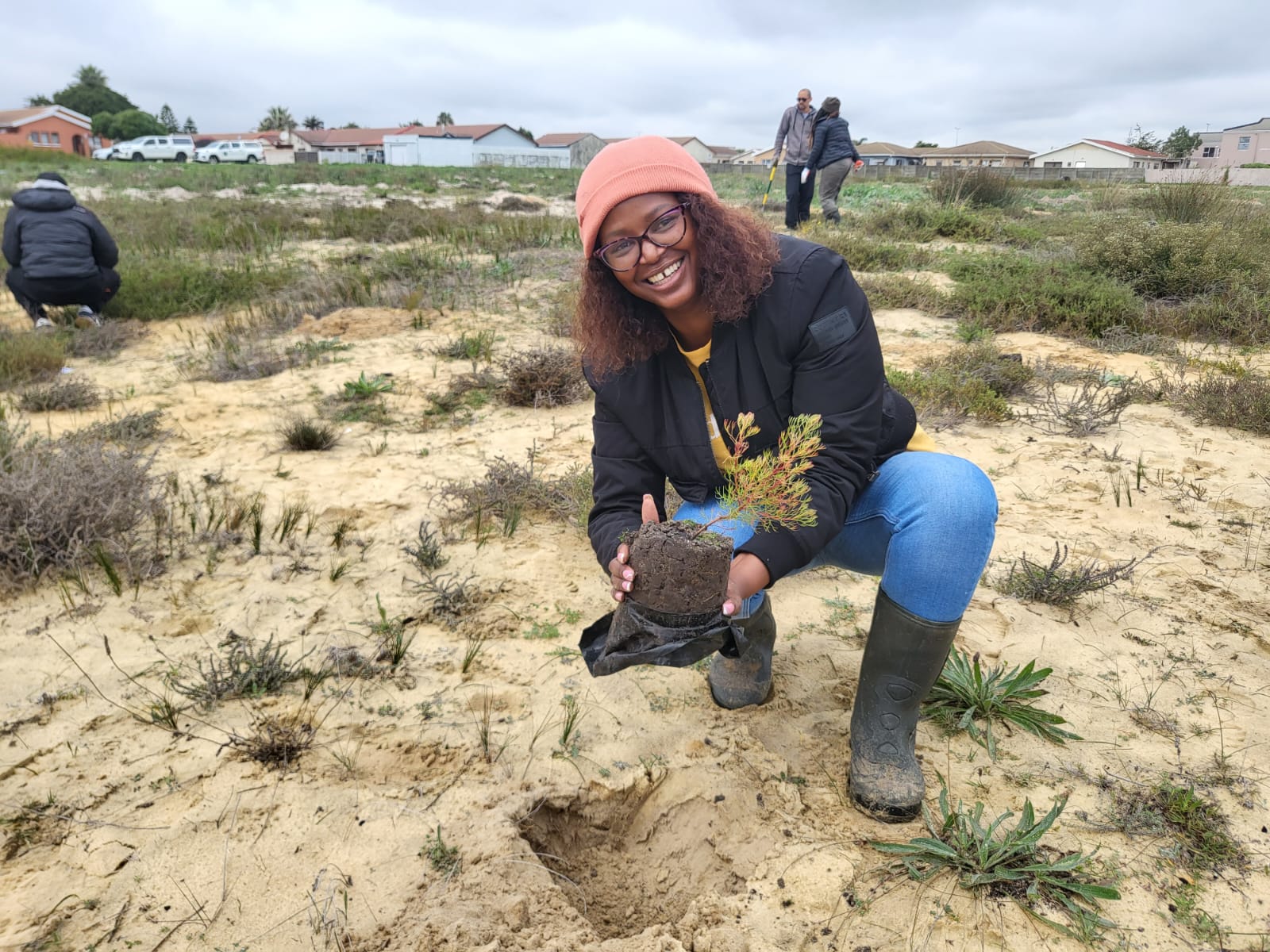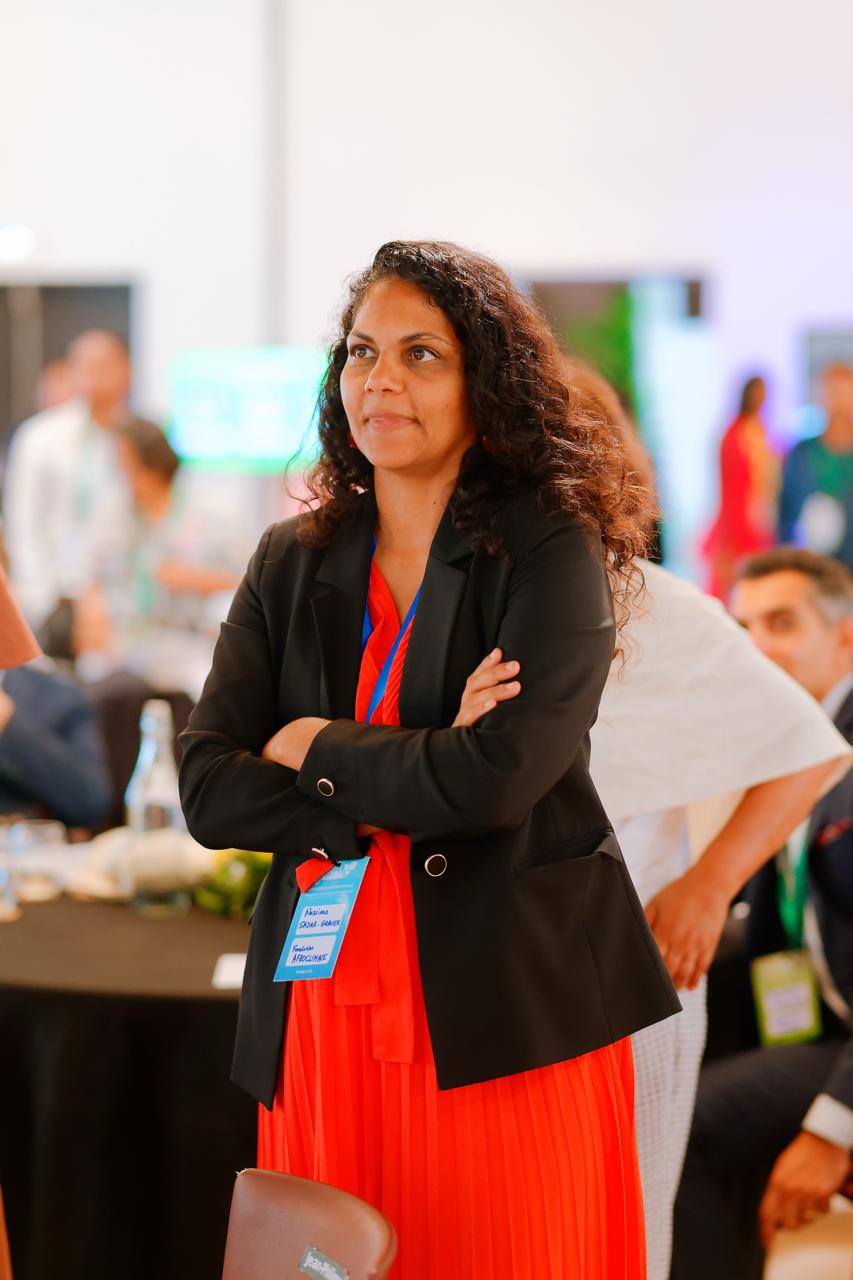...The bridge helped them open themselves to new opportunities. I want to be remembered as a bridge in that sense—one that improved people's lives.
The wanton destruction of forests has led to persistent spells of biting drought and hunger in Shamiso Mupara's home district, Marange. In 2012, she co-founded Environmental Buddies Zimbabwe (EBZ) to help reverse the damage.
Through EBZ, Shamiso has transformed the lives of rural communities in Zimbabwe by establishing nurseries and planting over 10,000 native trees across the country. She has also initiated environmental campaigns and training programs to help rural communities understand the effects of climate change and explore ways to live more sustainably.
The 2022 Women for the Environment Africa fellow shares insights from her journey with Damaris Agweyu.

Shamiso, if you were a tree, what kind would you be and why?
A pod mahogany because it's an all-rounder—resilient, giving and beautiful.
Your journey in one sentence.
The village girl who stepped onto the international arena and returned home to help her people.
Tell me more.
I was born in a village in Zimbabwe and grew up doing everything a typical rural girl does: fetching water and firewood, producing food, doing household chores etc. The most exciting thing for me was herding cattle because it allowed me to play in the forest.
I grew up in an area that had average rainfall. But in 1991-92, a severe drought wreaked havoc. The rivers dried up, wildlife migrated, and livestock died. My father had close to 150 cattle, which, in a rural setting, equates to a fat bank account. By the time the drought subsided, we had six cows left.
It became increasingly difficult for families—ours included—to put food on the table. When I was around six years old, my father passed on. My mother, a housewife then, had it even rougher.
Agriculture was no longer sustainable, and people turned to forests, cutting down and selling tree logs. No one was replanting. I remember a cousin of mine, Garikai Mupara, trying to mobilise people to plant trees in the mid-90s. He had little success.
When I was young, the link between environmental degradation, gender inequality and poverty was blurred. Later, when I started doing geography in high school, I began to see how environmental problems had led to severe social and economic issues in my village. The effects were especially tough on girls and women.
With more droughts, poverty increased. It became increasingly difficult for families to send children to school. And then patriarchy kicked in; because a male child is preferred over its female counterpart, if there were school fees for one child, the parents sent the boy to school. Girls as young as ten years would look for work as maids in villages or cities. Around the same time, the HIV-AIDS scourge was starting and the same girls became victims; they were forced to exchange their bodies for food (Sexto/Clito-currency). And when AIDS claimed the lives of parents, the girl child became the guardian; it didn't matter that she was 15 and had a 20-year-old brother.
I remember returning from boarding school to find that some of my previous classmates had HIV. Many had dropped out of school. Some had died from AIDS. Others had been married off to older men in exchange for grain or livestock.
This is the environment where I grew up. Luckily, my siblings and I did not suffer this fate. My parents had few resources but a different mindset altogether.
I was sent to boarding school for high school. In university, I pursued environmental science. I started wondering how I could use the knowledge I was gaining to make a difference in my village. If we brought back forests to the village, would it give women the space and time to do other things besides looking for firewood? What if there was sustainable agriculture where community members could plant and sell their produce? What if we introduced economic activities, such as bee-keeping and poultry? Wouldn't this empower women to make better decisions for themselves and their families?
I didn't have money, and I didn't have connections. Still, I was more educated than most of the women in my village. I knew I would one day use this education to help my community.
Tell me more about your parents' "different mindsets".
My father was a primary school teacher, and he firmly believed in education. When the environment in Zimbabwe was not conducive to pursuing his teacher training course, he migrated to Malawi to pursue his college education. You can't be sitting under a man like that and not be different.
When he passed on, I had just started primary school. I remained with a mother who ruled the house with an iron fist. She cared for seven children, five of her own and two of my cousins. I believe she felt like an iron fist was what it would take. She always reminded us that we were of the village but didn't have to conform to it.
We had a library at home, which was rare in rural settings. Every one of us was forced to read those books. I remember reading about the US in a book Titled; The Earth, Living in Our World and thinking about how it sounded so much better than my village. I told myself I needed to get an education, go to America, and never return.
And yet you returned.
I did. The first time I left my country was to go to Botswana. It was soon after completing my university education. Zimbabwe had severe economic problems, and I became an economic refugee in Botswana. I found a job as a domestic worker—never mind that I had a university degree.
Later, I graduated to a teaching job and started saving money for a Master's degree. My church (United Methodist Church) was offering scholarships which came with terms and conditions. We were required to return to our communities and start projects related to our courses. That's when my tree-planting journey began. Every other month, I would travel to Zimbabwe to implement systems. By the time I finished my degree in 2016, I had a full-scale project. Later, the church further sponsored me to participate in exchange programs in the USA and the UK.
I have been around, but the village is where my heart is. My father loved the village; he would be happy to know that the place he called home is well cared for.
I find city life suffocating. There is air and noise pollution. There is no space. There are hardly any trees. I remember when COVID struck, I was in the USA. They announced they would be locking down New York on 7th March. I ensured I was back in my village by then. Because what would I be doing in the city? Watching TV all day? In the village, I could go to the mountains and the river and visit relatives.
What are you looking to achieve through Environmental Buddies Zimbabwe?
We are looking to create sustainable communities through social entrepreneurship. One of our key objectives is to empower women and girls through reforestation programs. We want to plant trees and bring forests closer to communities. As a child, I hated walking 5-10 km in search of firewood. To think that girls are still doing this today is heartbreaking. We need to end this.
And no child should be forcefully married off because the family can't afford to put food on the table. We want to ensure families can feed themselves through smart agriculture. We are introducing drip irrigation and rainwater harvesting techniques and encouraging people to grow smaller grains. We have also introduced cassava and orange-fleshed sweet potatoes that are drought resistant.
We are doing everything we can to ensure food is on the table, our forests are protected, and the community has water.

How is the community's uptake?
Convincing communities not just to plant trees but to do it on a volunteer basis takes a lot of work. People generally believe that native forests rejuvenate on their own, which is true but not if we are putting so much pressure on them.
For the first eight years, no one would voluntarily come to our nursery asking to plant trees. Today, we have families with woodlots of indigenous trees. We've come a long way.
My work has inspired many people, some of whom I know and haven't seen in years and others I have never met. One person has been following me on Facebook and recently planted trees at his home. He put up a post saying: Inspired by Shamiso. I was shocked.
I'm now in a space where people consult me about trees and my work is recognised alongside prominent governmental organisations in this sector.
Your focus is on native or indigenous trees. Why is that?
There is a science behind native trees being drought and disease-resistant. Telling community members that indigenous trees require minimum care makes my job easier.
There is also a whole culture embroidered in our native forests. You hear a specific bird chirping and know the rain is coming. Traditional rain-making ceremonies were done under the Muhacha, Muzhanje and Mutsamvu trees. Lots of medicinal herbs that rural communities use are found in forests. We used to bury our dead on ant hills where certain indigenous trees such as African Ebony and Birds Plum were found. No one would dare cut down these trees.
But then poverty hit, our culture was eroded, and people started cutting and selling these trees out of desperation, greed, and ignorance.
How would you want to be remembered?
As a bridge…
There is a famous suspension bridge in my province, The Birchenough Bridge, that was built in 1935 by the British. Before this bridge, people were locked in and couldn't cross from Manicaland to Masvingo Province with ease. The bridge helped them open themselves to new opportunities.
I want to be remembered as a bridge in that sense—one that improved people's lives.
I had a mother who pushed me, but many children in my village don't have that. One of the things I do is identify academically gifted children and help them along the way. I house them, feed them, monitor their school work and the kind of friends they are keeping. I have, in essence, adopted them. One of them, a boy, is now at the university. If all six can go this far and each tries to raise six others, we will start to build power from the ground up.
***
This interview is part of a series profiling the stories of the 2022 WE Africa leadership programme fellows, African women in the environmental conservation sector who are showing up with a strong back, soft front, and wild heart.




